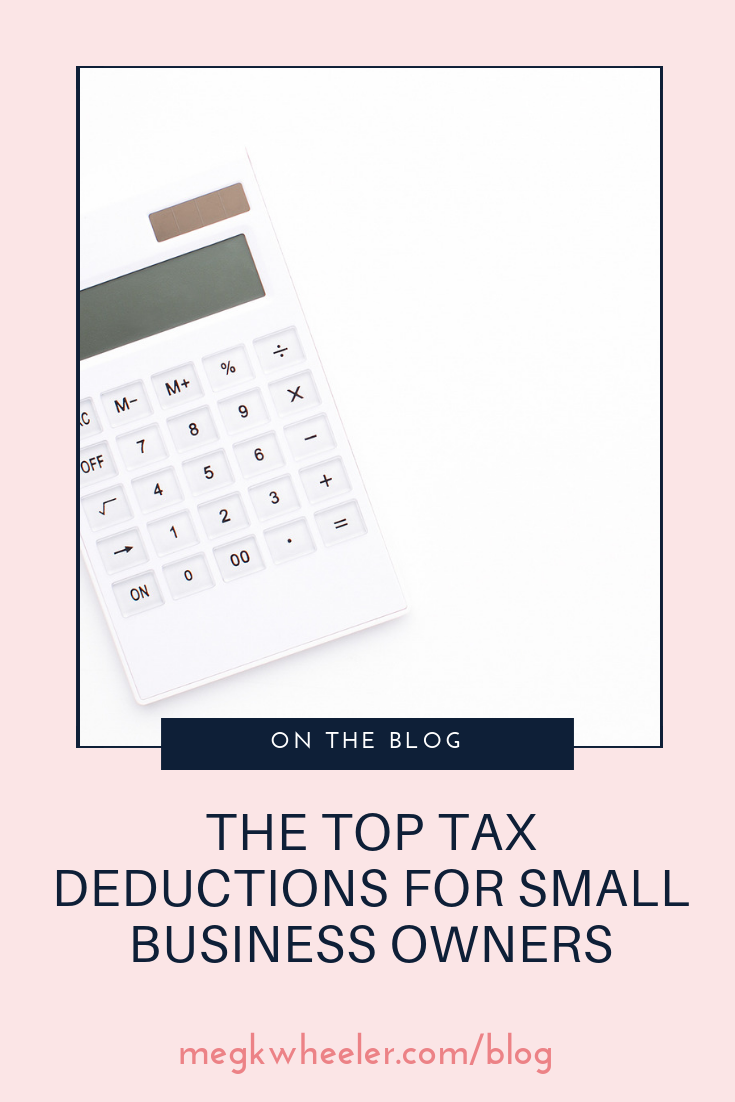Top Tax Deductions For Small Business Owners

Unless you’re like me (a former CPA), I’m guessing tax time doesn’t get you as excited as donuts or summer Fridays. But unfortunately (or fortunately!) for all of us, it does come around at least once a year. If you own a small business, you can’t ignore it. You have to learn how to efficiently manage tax deductions for small business owners on the get-go.
The good thing about tax time is that if you do own a small business, it’s likely that you’ll be able to deduct many of the things you had to spend money on throughout the last year. So there’s something to look forward to!
Because deductible expenses reduce your taxable income, it’s important to keep clear records of them. It’s crucial to stay on top of your expenses throughout the year so that you don’t miss any of those important benefits. But even if you haven’t been so good about that this year, you can still catch up with a little bit of hard work (and some sleuthing into your records…).
While most small business owners know that they can deduct office supplies and employee compensation, there are other deductions that I often see business owners forgetting. And it’s unfortunate because oftentimes these smaller deductions can add up to make a big difference. Here are some of the most common deductions you should be on the lookout for as a small business owner:
Advertising
The cost of printing business cards, your Facebook ads, and those adorable Moo discount postcards are all fully deductible as long as they are for your business.
Auto Expenses
If you use a vehicle for your business, you can potentially deduct the expenses for it. That is, as long as you can easily prove how much it was used for business purposes. You can do this via a physical paper mileage log in your car or one of many apps. Some of my favorite apps are QuickBooks Self-Employed if you use their software otherwise for your accounting, Stride Tax, Hurdlr, and MileIQ. When you’re deducting auto expenses, you have two options – you can either track the exact costs of gas, maintenance, etc. (and you MUST keep good records for this) or you can use the IRS’ standard rate (54.5 cents per mile in 2018); personally, I think this second option is much easier and usually adds up to about the same cost per mile.
Did you purchase a new car this year? If it was used more than 50% for business, you get to take a depreciation deduction for the cost of the car too (we talk about depreciation a little further down).
Bank Fees and Interest
At some point, you may find yourself needing to take out some debt to keep your business running or to expand. Luckily, interest on loans is typically fully deductible. Unless you start making $25million or more each year, in which case your deduction will be limited. You can also deduct any bank fees you incur to run your business.
Charitable Contributions
Do you give back to charities as part of your business model? That’s deductible! Just make sure it’s a qualified organization and you keep good records to substantiate the donation. And sorry, but those donations to your favorite political organization or candidate not tax deductible.
Cost of Goods Sold
If you stock inventory or otherwise create goods to sell, you’ll need to be mindful of how you account for those expenses. For example, if you make jewelry, you’ll have to pay for the chains, clasps, and beads in order to make each piece. These costs will get recorded in your accounting records as materials/inventory. You will generally only deduct these costs when you actually sell the piece of jewelry.
Education and Training
You know all those courses you signed up for this year? As long as they relate to your business and improve your skillset related to your business, they’re fully deductible. Technically, these expenses can be for classes, seminars, subscriptions to professional publications, workshops and even transportation to and from these classes.
Employee and Contractor Compensation
I’ve already mentioned this as a deductible expense but don’t forget those other costs for employees beyond their wages, such as bonuses, commissions and taxable fringe benefits (such as health insurance). You can also typically deduct payments made to independent contractors (but make sure to issue Form 1099s to them if you pay them over $600 each year). One important note here – payments to anyone who is not an employee or contractor (such as sole proprietors, partners and members of an LLC) are not deductible.
Home Office
Much like with your car, you can deduct your home expenses (mortgage, utilities, taxes) but only for the portion that was used for business purposes. However, and here’s the important part – the office must be used regularly and exclusively as the principal place of business, a location to meet clients or a separate structure used in the business. Meaning, if you meet clients in your home office but you also balance your personal checkbook there – no deduction for you. So make sure to keep that space reserved solely for your business and do your personal “business” in another part of the house. Note that there is also a simplified calculation method which allows you to take a $5/square foot deduction (up to 300 square feet) instead of calculating your exact expenses.
Insurance
If it’s for your business, it’s fully deductible. If you have insurance on your home office in the form of renter’s or homeowner’s insurance and your home office qualifies for a tax deduction (see above) then you can deduct the portion of the insurance attributable to your home office.
Legal and Professional Fees
As long as they are necessary and directly related to your business, they’re 100% deductible. This includes everything from hiring a lawyer to your QuickBooks subscription.
Licenses and Permits
Licenses required to run your business, such as a professional license or an alcohol resale license, are fully deductible. Resale permits and any permits required by government agencies are also deductible.
Meals and Entertainment
This rule has been around forever but it still trips people up. While there are some meals that are fully deductible, MOST meals are 50% deductible. Why? Because the thought is that you would have had to eat anyway, and your business shouldn’t get a deduction for something that is essentially a personal expense. Make sure you keep your receipts and make a note of what was discussed at the meal so you can substantiate this to the IRS if you need to.
With a few limitations, food for public events and employee events are potentially 100% deductible (note, this does NOT mean meals with employees for meetings).
Oh and take note that beginning in 2018, entertainment expenses are no longer deductible.
Merchant Processing Fees
Use Shopify or Square for your online shop? Those pesky fees they charge you are 100% deductible!
Retirement Contributions
Depending on your tax entity status and a few other factors, if you have some extra cash lying around at year end, you may want to put it in an IRA because, you guessed it, you’ll get a deduction for this! Contributions to a retirement account can be a good way to reduce your tax burden in years when you’ve brought in a lot of income and have extra cash to spare.
Tangible Property
At the risk of making you want to pull your hair out, let’s talk about tangible property and depreciation.
The short version is that when it comes to certain property (such as office furniture), the IRS may require you to depreciate it instead of taking the full expense as a tax deduction immediately.
What the heck does “depreciate” mean? It means that if you purchase a computer that costs $2,000 and has a useful life of 4 years (the IRS has guidelines to determine useful life), you will take a $500 depreciation deduction every year for 4 years.
The logic behind this is that the computer has a functional, useful life over a period of a few years, so your deduction of that item’s cost should occur over the same period of years.
However, when it comes to certain property (usually tangible, depreciable, personal property that is acquired for use in a business such as computers, desks, etc. and some real property), the IRS allows you to expense the entire cost of the item immediately if you meet a few conditions.
The one that is most likely relevant for small business owners is that you can’t deduct more than you have in income from your business in that year. So if your business’ income is $50,000 for the year, you can only deduct up to $50,000 in property under this exception.
Everything else can be depreciated over a period of time (the IRS has charts to show you the relevant time period) and a deduction for that depreciation can be taken each year.
Travel
If you or anyone who works for you travels for business purposes, the cost for transportation and lodging is fully deductible, as long as you meet certain requirements by the IRS (for example, you can’t tack on one business meeting to a personal trip and call it a business trip). Note that regular commuting expenses are NOT deductible.
New For 2018
Perhaps the most exciting deduction of all is the one that we’ve never had before. Beginning this year, owners of pass-through entities (sole proprietorships, S corporations and partnerships) will get a nice tax boost. Owners will get to take a 20% deduction on qualified business income, assuming they are eligible and don’t meet the criteria for this deduction to be otherwise limited.
The Takeaway
Keep in mind, this does not cover EVERY possible deduction your business can likely take – only the most common ones. So it’s always a good idea to talk with a qualified accountant who not only understands your business but is up-to-date on the ever-changing tax laws. While it might seem like an expense you can’t afford, talking to an accountant regularly will ensure you don’t end up in trouble with the IRS and facing a hefty bill down the line.
